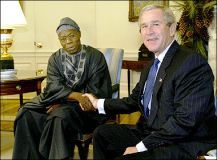Bush thanks 2 African leaders for Sudan work
May 6, 2006 (ABOARD AIR FORCE ONE) — President Bush thanked two African leaders on Saturday for their role in helping negotiate a peace pact to end the violent conflict in Sudan’s Darfur region.

|
|
US President George W. Bush (R) meets with Nigerian President Olusegun Obasanjo in the Oval Office at the White House in Washington, DC., December 2, 2004. |
Bush called Olusegun Obasanjo, the Nigerian president who hosted the long talks on Darfur, and Denis Sassou-Nguesso, the president of the Republic of Congo and current head of the 53-nation African Union.
Bush, who made the calls from Air Force One while flying to Oklahoma for a university commencement address, told Obasanjo that “we need to work together to transition this to the United Nations,” White House spokesman Dana Perino told reporters.
U.N. Secretary-General Kofi Annan wants Sudan to grant visas to a U.N. assessment team so it can visit Darfur and start planning for a U.N. peacekeeping force to take over from the African Union troops. Sudan has refused to allow the team to visit.
The agreement signed Friday was between the government and the main rebel group, the Sudan Liberation Army; two smaller rebel groups refused to sign.
In the call to Sassou-Nguesso, Bush “stressed that this is a significant step forward in a long process to end the conflict and suffering in Darfur and bring peace to the region.”
A State Department who helped spur negotiators is hoping that the agreement will lead Sudan “to turn from guns and bullets to making decisions by the political process.”
On a telephone hookup from Abuja, Nigeria, Deputy Secretary of State Robert Zoellick said, “We want to keep our focus on the people of Darfur.”
Some 180,000 people have been killed and an additional 2 million left homeless in a genocidal war.
Zoellick said it was not clear when a U.N. peacekeeping force could move into the area. It could take six months or more, he said.
Darfur “is going to remain a dangerous place,” he said. “There is still a lot of distrust and fear.”
Zoellick said the United States had asked Rwanda to send in 1,200 troops to supplement the 7,000 African Union monitors in place.
Bush intervened during the difficult negotiations, sending a letter to the largest rebel group with assurances the U.S. would give strong support to putting in place the peace accord, assist monitoring compliance, hold accountable those who do not cooperate and support a donors’ conference for Darfur, Zoellick said.
The White House welcomed the peace agreement, calling it a significant step in a long process toward achieving calm for the people of Darfur.
(ST/AP)
